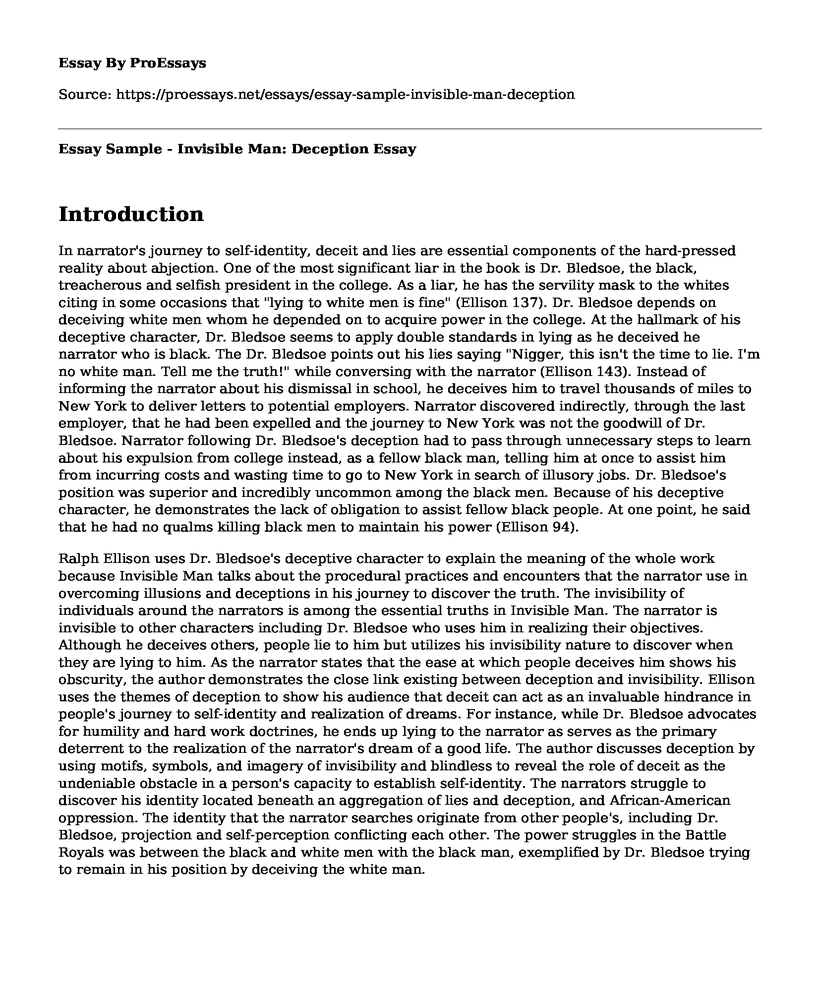Introduction
In narrator's journey to self-identity, deceit and lies are essential components of the hard-pressed reality about abjection. One of the most significant liar in the book is Dr. Bledsoe, the black, treacherous and selfish president in the college. As a liar, he has the servility mask to the whites citing in some occasions that "lying to white men is fine" (Ellison 137). Dr. Bledsoe depends on deceiving white men whom he depended on to acquire power in the college. At the hallmark of his deceptive character, Dr. Bledsoe seems to apply double standards in lying as he deceived he narrator who is black. The Dr. Bledsoe points out his lies saying "Nigger, this isn't the time to lie. I'm no white man. Tell me the truth!" while conversing with the narrator (Ellison 143). Instead of informing the narrator about his dismissal in school, he deceives him to travel thousands of miles to New York to deliver letters to potential employers. Narrator discovered indirectly, through the last employer, that he had been expelled and the journey to New York was not the goodwill of Dr. Bledsoe. Narrator following Dr. Bledsoe's deception had to pass through unnecessary steps to learn about his expulsion from college instead, as a fellow black man, telling him at once to assist him from incurring costs and wasting time to go to New York in search of illusory jobs. Dr. Bledsoe's position was superior and incredibly uncommon among the black men. Because of his deceptive character, he demonstrates the lack of obligation to assist fellow black people. At one point, he said that he had no qualms killing black men to maintain his power (Ellison 94).
Ralph Ellison uses Dr. Bledsoe's deceptive character to explain the meaning of the whole work because Invisible Man talks about the procedural practices and encounters that the narrator use in overcoming illusions and deceptions in his journey to discover the truth. The invisibility of individuals around the narrators is among the essential truths in Invisible Man. The narrator is invisible to other characters including Dr. Bledsoe who uses him in realizing their objectives. Although he deceives others, people lie to him but utilizes his invisibility nature to discover when they are lying to him. As the narrator states that the ease at which people deceives him shows his obscurity, the author demonstrates the close link existing between deception and invisibility. Ellison uses the themes of deception to show his audience that deceit can act as an invaluable hindrance in people's journey to self-identity and realization of dreams. For instance, while Dr. Bledsoe advocates for humility and hard work doctrines, he ends up lying to the narrator as serves as the primary deterrent to the realization of the narrator's dream of a good life. The author discusses deception by using motifs, symbols, and imagery of invisibility and blindless to reveal the role of deceit as the undeniable obstacle in a person's capacity to establish self-identity. The narrators struggle to discover his identity located beneath an aggregation of lies and deception, and African-American oppression. The identity that the narrator searches originate from other people's, including Dr. Bledsoe, projection and self-perception conflicting each other. The power struggles in the Battle Royals was between the black and white men with the black man, exemplified by Dr. Bledsoe trying to remain in his position by deceiving the white man.
Works Cited
Ellison, Ralph. Invisible Man. New York: The New American Library, 1952. Print
Cite this page
Essay Sample - Invisible Man: Deception. (2022, Apr 07). Retrieved from https://proessays.net/essays/essay-sample-invisible-man-deception
If you are the original author of this essay and no longer wish to have it published on the ProEssays website, please click below to request its removal:
- Literary Essay Example: Textual Analysis of Macbeth
- Use of Symbolism in the Poem "Daddy" by Sylvia Plath Essay
- Oedipus Rex by Sophocles Essay Example
- Common Sense by Thomas Paine - Literary Essay Sample
- Literary Analysis Essay on "The Tyger" and "The Lamb"
- Comparison Essay Sample on Cinderella Folk Story and Hamlet
- Macbeth: Use of Dramatic Irony Essay Example







